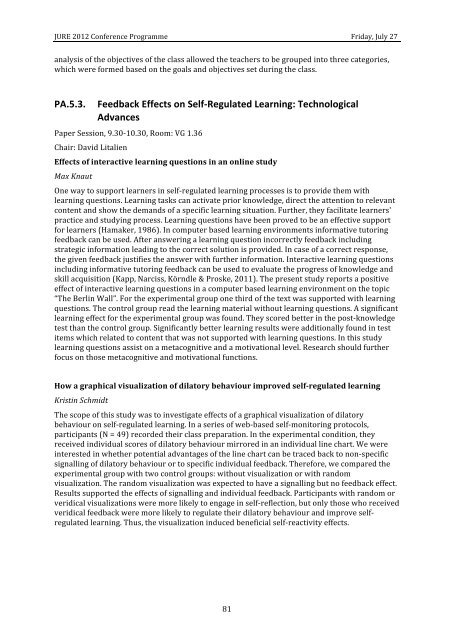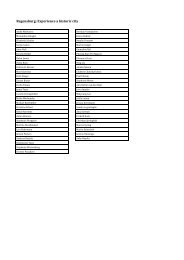JURE 2012 Programme book - EARLI Jure 2012
JURE 2012 Programme book - EARLI Jure 2012
JURE 2012 Programme book - EARLI Jure 2012
Create successful ePaper yourself
Turn your PDF publications into a flip-book with our unique Google optimized e-Paper software.
<strong>JURE</strong> <strong>2012</strong> Conference <strong>Programme</strong> Friday, July 27<br />
analysis of the objectives of the class allowed the teachers to be grouped into three categories,<br />
which were formed based on the goals and objectives set during the class.<br />
PA.5.3. Feedback Effects on Self-‐Regulated Learning: Technological<br />
Advances<br />
Paper Session, 9.30-‐10.30, Room: VG 1.36<br />
Chair: David Litalien<br />
Effects of interactive learning questions in an online study<br />
Max Knaut<br />
One way to support learners in self-‐regulated learning processes is to provide them with<br />
learning questions. Learning tasks can activate prior knowledge, direct the attention to relevant<br />
content and show the demands of a specific learning situation. Further, they facilitate learners'<br />
practice and studying process. Learning questions have been proved to be an effective support<br />
for learners (Hamaker, 1986). In computer based learning environments informative tutoring<br />
feedback can be used. After answering a learning question incorrectly feedback including<br />
strategic information leading to the correct solution is provided. In case of a correct response,<br />
the given feedback justifies the answer with further information. Interactive learning questions<br />
including informative tutoring feedback can be used to evaluate the progress of knowledge and<br />
skill acquisition (Kapp, Narciss, Körndle & Proske, 2011). The present study reports a positive<br />
effect of interactive learning questions in a computer based learning environment on the topic<br />
“The Berlin Wall”. For the experimental group one third of the text was supported with learning<br />
questions. The control group read the learning material without learning questions. A significant<br />
learning effect for the experimental group was found. They scored better in the post-‐knowledge<br />
test than the control group. Significantly better learning results were additionally found in test<br />
items which related to content that was not supported with learning questions. In this study<br />
learning questions assist on a metacognitive and a motivational level. Research should further<br />
focus on those metacognitive and motivational functions.<br />
How a graphical visualization of dilatory behaviour improved self-‐regulated learning<br />
Kristin Schmidt<br />
The scope of this study was to investigate effects of a graphical visualization of dilatory<br />
behaviour on self-‐regulated learning. In a series of web-‐based self-‐monitoring protocols,<br />
participants (N = 49) recorded their class preparation. In the experimental condition, they<br />
received individual scores of dilatory behaviour mirrored in an individual line chart. We were<br />
interested in whether potential advantages of the line chart can be traced back to non-‐specific<br />
signalling of dilatory behaviour or to specific individual feedback. Therefore, we compared the<br />
experimental group with two control groups: without visualization or with random<br />
visualization. The random visualization was expected to have a signalling but no feedback effect.<br />
Results supported the effects of signalling and individual feedback. Participants with random or<br />
veridical visualizations were more likely to engage in self-‐reflection, but only those who received<br />
veridical feedback were more likely to regulate their dilatory behaviour and improve self-‐<br />
regulated learning. Thus, the visualization induced beneficial self-‐reactivity effects.<br />
81



